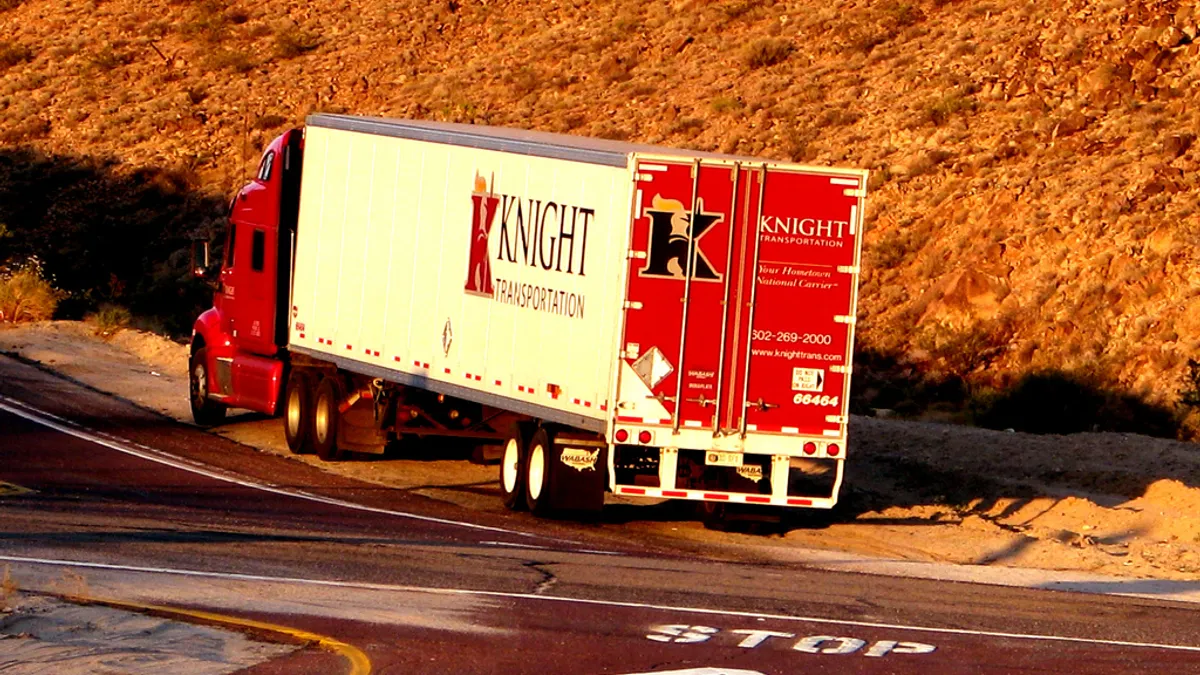Dive Brief:
- Revenue in the dedicated contract carriage market was down 3% in the first half of 2020, compared to the first half of 2019, according to a report by Armstrong & Associates. Although shipment volumes were down in the segment, long-term contracts signed before the pandemic helped to lessen impact from the coronavirus.
- "We expect more modest DCC demand and growth for 2020. A lot will depend on underlying contract truckload rates finding support in the market later in 2020 and disruptions from the Coronavirus on shipper and DCC operations," the report stated. The firm expects customer rates to be "positive to flat" for the rest of the year, compared to the first six months of 2020, said Armstrong & Associates President Evan Armstrong.
- J.B. Hunt Dedicated Contract Services is ranked No. 1 by the report in terms of number of Class 8 tractors, according to the report. The carrier owns 13.5% of the dedicated market, based on its net revenue, which grew about 25% year over year to $2.7 billion for the whole of 2019. Armstrong & Associates called that growth "above average."
Dive Insight:
2018 was an "extraordinary year" for 3PLs, the report said, and 2019, which had much to live up to, "went down as a mixed year." 2020 has been difficult to forecast, though the trucking industry's biggest players have begun to restore guidance for the year. According to Armstrong & Associates, the uncertain market will play into the hands of dedicated carriers.
"We anticipate the COVID-19 economic volatility in domestic transportation and increases in domestic transportation demand to [positively] impact DCC growth for the remainder of the year as shippers look for a safe haven for capacity and as DCC providers continue to benefit from contracts negotiated prior to the pandemic," the report stated.
Truckload capacity usually declines at this point in the year. Shippers and brokers posted an 8.6% increase in loads, week over week, while truck postings fell 8% as supply chain disruptions pushed more freight to the spot market, according to DAT.
While contracts can shield shippers now when spot rates are high, they helped shield carriers when volumes dropped in March and April.
J.B. Hunt's dedicated segment saw revenue decrease 1% in the second quarter, compared to the same quarter in 2019. Revenue from productivity, which it defines as revenue per truck per week, excluding fuel charge, remained flat year over year. Customer retention rates stayed above 97%.
Knight-Swift, ranked fourth, reported in its Q2 earnings that it "continued to see improvement" in its dedicated segment. The carrier includes dedicated with the rest of its trucking segment, which reported revenue was down 9% YoY.
For Werner, ranked fifth, trucking revenues (net of fuel surcharge) for the first half of 2020 were up almost 6%, YoY. "Approximately three-quarters of our Dedicated revenues are with essential products customers, and their freight volumes were generally strong during second quarter 2020. A few Dedicated customers were more significantly impacted by COVID-19 and had lower volumes," the carrier reported. "We expect Dedicated new business implementations to begin to pick up in third quarter 2020 as businesses reopen."
One reason some fleets' dedicated operations remain mostly unscathed by the turbulent conditions is that contracts have terms of one to three years with asset requirements. "This makes them much 'stickier' than standard shipper/ carrier trucking contracts and were a strong contributor to the segment’s continued strong performance in 2019," the Armstrong & Associates report stated.
But Ryder, ranked second, saw revenue for its dedicated business drop 19% YoY in Q2. The carrier cited "lower subcontracted revenue and lower fuel costs, passed through to customers." In its earnings report, Ryder said "no material COVID-19 impacts" were expected for its dedicated segment.












